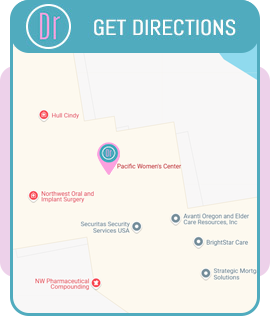Gynecologic Reconstructive Surgery Specialist in Eugene, OR
Gynecologic reconstructive surgery addresses complex issues such as pelvic organ prolapse, incontinence, and vaginal repairs. Dr. Richard Beyerlein MD, CPI, FACOG, and Tamara A. Stenshoel, MD, FACOG provide expert care at Pacific Women’s Center in Eugene, OR, to restore comfort and function. For more information, contact us or schedule an appointment online. We are conveniently located at 911 Country Club Rd. Suite 222, Eugene, OR 97401.




Table of Contents:
What are examples of reconstructive surgery?
How is reconstructive surgery done?
What does a Urogynecologist do?
What is female pelvic medicine and reconstructive surgery?
The female reproductive system is a complex unit of organs that work endlessly to ensure that the body is functioning properly and can perform sexual and reproductive functions. When one of the organs involved in the female reproductive system does not function properly, it may be due to injury or disease. Sometimes the best course of action is reconstructive surgery, which can help to remove irregularities or abnormalities to improve organ function.
There are several different kinds of gynecologic reconstructive surgery, including:
• Diagnostic Hysteroscopy
• Endometrial Ablation
• Laparoscopic Fibroid Removal
• Laparoscopic Gynecological Surgery
• Laparoscopic Treatment of Ovarian Cysts
• Minimally Invasive Gynecologic Surgery
• Loop Electrosurgical Excision Procedure
• Polypectomy
• Myomectomy
• Pelvic Floor Reconstruction
Reconstructive surgery is done in a urogynecologist’s office or operating room, which may be located in a hospital and may require the use of anesthetics. The goal of reconstructive surgery is to restore organs to their original position and therefore restore their proper function. Some types of reconstructive surgery are done through an incision in the vagina, while others are done through an incision in the abdomen or with laparoscopy.
Urogynecologists help women who have pelvic floor conditions. These female health specialists handle everything from evaluation and diagnosis to treatment, management and prevention. The primary focus of urogynecology is to improve quality of life.
Treatment for pelvic floor conditions may include:
• Various therapies: Different types of therapy may be used to treat pelvic floor conditions and can include relaxation techniques, muscle training, and dietary changes to help manage symptoms.
• Hormones: Depending on the condition being treated, hormone therapy may be an option for treatment.
• Surgery: Depending on the condition, surgical options vary from minimally invasive and laparoscopic procedures to reconstructive surgery.
Female pelvic medicine, also referred to as urogynecology, is a specialty of gynecology that focuses on treating pelvic floor disorders. Pelvic floor dysfunctions affect about half of all women and can lead to decreased quality of life. These conditions include urinary incontinence, pelvic organ prolapse (displacement), fecal incontinence, chronic pelvic pain, and sexual dysfunction.
Reconstructive surgery refers to any surgical intervention that corrects pelvic floor disorders. The types of procedures included in this specialty may include any of the following:
• Abdominal sacrocolpopexy: This type of surgery is used to correct the supporting muscles, tissues and ligaments of the vagina.
• Uterosacral ligament suspension: This kind of surgical procedure restores support to the uterus or vagina.
• Sacrospinous fixation: This is an additional operation that helps to restore support to the uterus or vagina.
• Midurethral sling: To prevent it from dropping during physical activity, this procedure provides support under the urethra.
• Burch urothropexy: This is another surgical procedure that provides support to the urethra.
• Pubovaginal sling: This surgical procedure is used to help manage urinary incontinence.
• Anterior and/or posterior repairs: These include repairs to both the vagina and the bladder.
• Fistula repairs: This repairs vaginal fistulas.
• Congenital anomaly repairs: This procedure helps repair many congenital (present since birth) pelvic floor anomalies.
• Ureteral stents: This procedure involves the insertion of a thin tube into the ureter to help remove obstructions of the flow of urine.
• Mesh removal: This type of procedure removes vaginal mesh that was previously placed to treat pelvic organ prolapse or urinary incontinence.
• Sacral neuromodulation: During this type of surgery, a neurostimulator that is implanted electrically stimulates the sacral nerve to help treat both fecal and urinary incontinence.
If you or someone you love has a pelvic floor disorder, come to Pacific Women’s Center today. Our kind and compassionate professionals are experienced in treating many different types of pelvic floor disorders and can help improve your quality of life. Call us today to book an appointment. We look forward to serving you! We serve patients from Eugene OR, Springfield OR, Coburg OR, Creswell OR, Cottage Grove OR, Lowell OR, and Junction City OR.

ADDITIONAL SERVICES YOU MAY NEED
❱ Abdominal Hysterectomy
❱ Bladder Lift Surgeon Q&A
❱ Cervical Cone Biopsy
❱ Colposcopy
❱ Endometrial Ablation
❱ Endometrial Biopsy
❱ Female Sexual Dysfunction
❱ Gynecological Surgery
❱ Gynecology
❱ Hormone Therapy
❱ Vaginal Hysterectomy
❱ Endometriosis Diagnosis & Care



